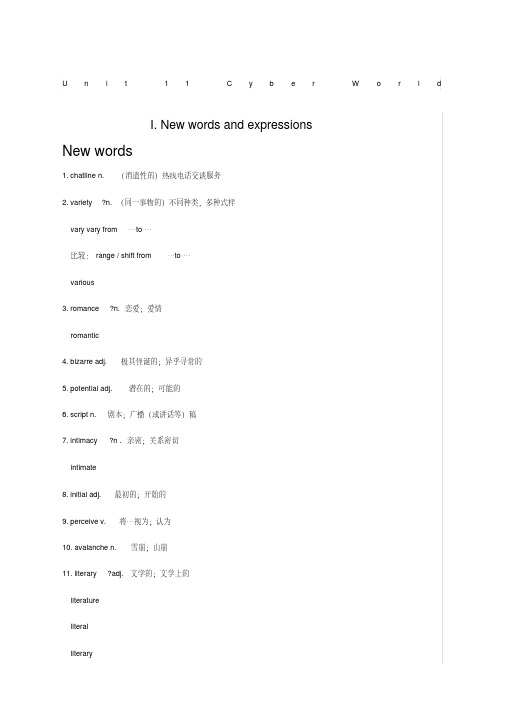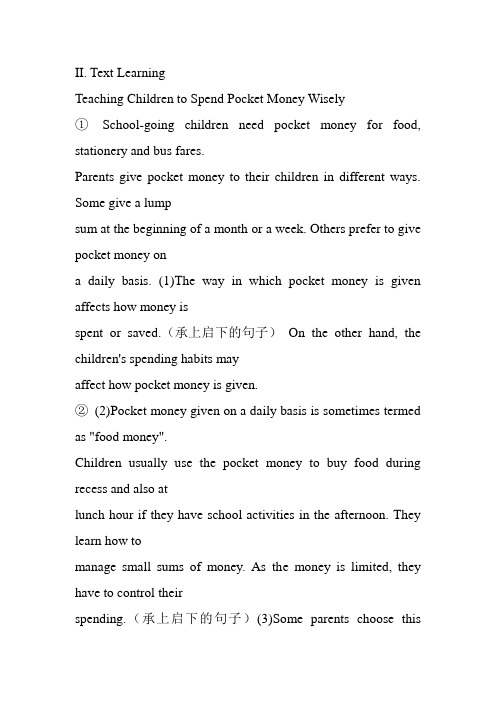新版英语自考二讲义重点6
自考英语二教材课文讲义unit

U n i t11C y b e r W o r l dI. New words and expressionsNew words1. chatline n. (消遣性的)热线电话交谈服务2. variety?n. (同一事物的)不同种类,多种式样vary vary from…to…比较:range / shift from…to…various3. romance?n. 恋爱;爱情romantic4. bizarre adj. 极其怪诞的;异乎寻常的5. potential adj. 潜在的;可能的6. script n. 剧本;广播(或讲话等)稿7. intimacy?n . 亲密;关系密切intimate8. initial adj. 最初的;开始的9. perceive v. 将…视为;认为10. avalanche n. 雪崩;山崩11. literary?adj. 文学的;文学上的literatureliteralliterateliberal12. verse n. 诗;韵文13. animated adj. 栩栩如生的;(似)能活动的14. inclination?n. 倾向;意愿inclineinclined15. sweaty adj. 满是汗的;汗津津的16. palm n. 手掌;手心17. vary v. 相异;不同18. convey v. 表达,传递(思想、感情等)19. polish v. 修改;润饰;润色20. intellect n. (尤稻高等的)智力,思维逻辑领悟力21. personality n. 性格;个性;人格22. sequence n. 顺序;次序23. reverse v. 颠倒;彻底转变;使完全相反24. veil?v. 掩饰;掩盖unveil 揭露,揭开25. intellectual adj. 智力的;脑力的;理智的26. familiarity?n. 熟悉;通晓familiarfamiliarize28. intensity?n. 强烈;紧张;剧烈intense29. stirring n. (感情、想法或发展的)开始,出现,萌发31. flesh n. (动物或人的)肉32. suspect?v. 疑有,觉得(尤指坏事可能属实或发生)33. correspondence?n. 通信;通信联系34. albeit conj. 尽管;虽然35. demon n. 恶魔;魔鬼36. determine?v. 决定determineddetermination37. extract?v. 选取;摘录;录38. addict?n. 对…入迷的人addictedaddictivebe / get addicted to sth.39. hop v. 突然快速去某处40. flirtation n. 调情41. addictive adj. 使人入迷的42. confession?n. 认罪;供认;坦白43. multiple adj. 数量多的;多种多样的44. court v. (男子向女子)求爱,追求Phrases and Expressions1. head over heels in love?深深地爱着某人;迷恋2. butterflies in the stomach?心里七上八下3. deprive…of…?剥夺;使丧失II. Text LearningCyber love①Thanks to the late 20th century technology, Maria of Denmark and Martijin of Holland meton a chatline. For months they've talked and sent letters to each other?with the help of their computers as they?found themselves falling head over heels in love. It was then that?they decided to meet in the real, not only the virtual, world. It was not easy to arrange as the young man and his lady were separated by 700 very real kilometers, but the date was a success andMaria and Martijn have been living together happily?ever since. They've created a home pageto let the world know how they've found?happiness?via?the Internet and introduce couples who've met?under similar circumstances.②Throughout history men and women had used? a variety of means?to find each other.Internet romance, according to some, is a bizarre method, and to others it is a natural wayfor?the 90's?to meet?potential mates.③Romances formed on the internet?follow a characteristic script.?The development of emotional intimacy is a long process, sometimes taking several months. "Love at?first byte" is rare although there are examples. (1)The initial light exchanges, whether by e-mail or in chatrooms, are generally followed by increasingly self-revealing topics, and then after a while, the two strangers perceive each other as a true friend.?Hearts open and an avalanche of e-mailverses and virtual gifts (flowers, kisses, animated pictures). Could any heart with romanticinclinations resist? (2)When you reach for the mouse with sweaty palms and butterflies in the stomach to look in the in-box for new mail - there's just no way to escape the fact - love has arrived.④How does a cyber romance vary from a real life romance? Perhaps one significantdifference is that communication plays such a large part. Words that convey feelings have enormous effect. (3)While before a real date we fix our hair and our clothes, on the internet we polish our intellect, imagination and personality.?(4)In essence, the sequence is reversed - first we show our inner beauty and only after it had won victory does the veil fall off the physicalvehicle of that personality at the time of that first meeting in person.⑤It is a popular topic in cyberspace to debate whether or not true love can develop merelyon an?intellectual level(智力方面,精神方面,即"精神恋爱"), without physical attraction or the?familiarity?of the other's appearance? (5)To put it another way: is the physical appearance of the man or woman play a part in the relationship if, through the exchange ofthoughts and feelings, they already fell in love?本部分重点及难点:1. The initial light exchanges, whether by e-mail or in chat rooms, are generally followed byincreasingly?self-revealing topics, and then after a while, the two strangers perceive eachother as a true friend.不管是通过电子邮件还是聊天室,最初是简单的交流,然后是越来越多自我表露的话题,过了一段时间之后,两个陌生人把彼此当成了真正的朋友。
自考英语二重点语法知识讲解

重点语法知识讲解1.动词的时态和语态动词的时态和语态一览表时态语态一般现在时一般过去时一般将来时主动被动 do are done did were done will do will be done现在进行时过去进行时将来进行时主动被动 are doing are being done were doing were being done will be doing现在完成时过去完成时将来完成时主动被动 have done have been done had done had been done will have done will have been done现在完成进行时主动被动 have been doing1.1 现在完成时发生在过去的动作一直持续到现在,或对现在仍有影响。
现在完成时的标志: so far, by now/ up to now,for three years, since 1995, in the past two decades1.2 过去完成时过去的过去。
1)said, reported, thought 等引导的间接引语中。
He missed the train.He said he had missed the train.2)hardly…when, no sooner… than句型中表示先发生的动作No sooner had he got up than he received the call.3)与过去事实相反的虚拟语气中If I had tried harder, I would have won.I wish I had done better in the exam.1.3 完成进行时从过去一直持续到现在,没有间断。
汉语提示语:一直The water has been running the whole night.1.4 过去时过去某一具体时间发生的事,不考虑与现在的关系。
英语二重点班讲义

英语二重点班讲义完整版讲义---华夏大地自考高伟老师主讲,真的很MAN!!第一单元知识点的回顾Text A1.choose----choice:词型转换经常考,同时注意该词的过去式和过去完成式。
2.★available:这个词考的频率很高。
换句话说,如果在答案中出现了该词,从词义上应该给予其优先考虑。
这个词出现的句子中经常会同时出现ticket, food, book等。
3.decide----decision,注意词性上的变化。
4.purpose:这个词一旦出现,它既可以考本词的意思,也可以考后面的谓语动词的形式,记住:凡是出现purpose, aim, objective, plan,dream, goal等有含有目的性的词,后面的谓语动词一定是to do的形式,同时关注这些词是否为复数形式,如果是,谓语动词一定是复数的。
5.achieve----achievement,注意词型上转换。
6.★in the way:妨碍,挡路,阻碍。
区别in a way:从某种程度上。
★on theway (to)在去…路上(★on the way home)和by the way:顺便说一句。
7.★★involve----involvement(in):注意词型转换,词义及介词搭配。
8.★consider----consideration。
注意词型上的转换,同时牢记take intoconsideration(account),如果单独考本词,后面的动词一定是+ing形式(动名词),但注意主动和被动含义上的区别。
9.make a guess at:注意固定习语的搭配。
10.certain----certainly----★certainty----★★uncertainty:注意词性和词义上的转换。
11.risk:注意后面接ing的动名词形式。
12. sometimes…;at other times…:注意前后句型上的搭配,很有可能在完型里考。
自考英语二重点复习资料

1. organizational: a 组织上的组织上的由此我们可以联想到:organize: v 组织;organization: n 组织;organizer: n 组织者请看下列习题,选择该组词里恰当的词填空:1). Last week, our school ________ a spring outing. 2). The task calls for the highest _________ skill. 3). China has joined World Trade __________. 4). He is the __________ of the speech contest. Answers: organized, organizational, Organization, organizer 2. objective: n 目标;目标;a 客观的,反义词subjective: 主观的3. predict: v 预言、预示;预言、预示;由此我们可以联想到:prediction: n 预言;predictable: a 可预测的;predictor: n 预言家4. simplify: v 简化简化由此我们可以联想到:simple: a 简单的;simply: ad 简单地,仅仅地;simplification: n 简化;simplified: a 被简化的。
Exercises for the above words: 1). The machine is _____ in operation but complex in structure. the original is beyond our capacity while ____ edition 2). Shakespeare’s Romeo and Juliet in is quite easy. 3). There is no point in arguing about it, because it is _______ a question of procedure. 4). The ______ of working process freed the workers fro heavy labor. Answers: simple; simplified; simply; simplification 5. tendency: n 趋势、倾向;倾向于…,tend to do sth 趋势、倾向;tend : v 倾向于e.g. old people have the tendency of getting fatter. Or old people tend to get fatter. 6. managerial: a 经理的、经营上的;经理的、经营上的;由此我们可以联想到:manage: v管理、经营;management: n; manager: n 经营者,管理者;manageable: a 可管理的、可经营的。
自考《英语二》讲义总结大纲

英语(二)学习是一种信仰英语(二)讲义【00015】【内部资料】课程介绍一、课程性质英语(二)是高等教育自学考试各专业(英语专业除外)本科阶段的公共基础课。
三、本资料介绍针对英语(二)试题中第一题到第四题,本资料给出对应的解题技巧及真题举例;第五题和第六题主要涉及到英语语法,本资料将近5 年真题涉及到的语法知识进行总结,详细解释并举对应的真题为例;针对第七题作文部分,本资料给出写作模板及参考例文。
如果您能认真阅读本资料并掌握其中的解题技巧和语法知识,那么您一定能顺利通过考试!目录第一部分语法知识 (4)第一单元名词形容词副词介词 (4)第一章名词 (4)第二章形容词 (5)第三章副词 (8)第四章介词 (10)第二单元谓语动词 (11)第一章系动词 (12)第二章情态动词 (12)第三章时态 (13)第四章英语语态 (16)第三单元非谓语动词 (17)第一章动词不定式 (18)第二章分词 (19)第四单元从句 (21)第一章名词性从句 (21)第二章形容词从句(定语从句) (21)第三章副词从句(状语从句) (21)第五单元并列结构 (22)第二部分应对技巧 (24)第一章阅读判断 (24)第二章阅读选择 (28)第三章概括段落大意和补全句子 (33)第四章填句补文 (36)第五章填词补文 (38)第六章完形补文 (40)第七章短文写作 (41)一、概念第一部分语法知识第一单元名词形容词副词介词第一章名词名词表示人、事物、地点或抽象概念的名称。
如:person,phone,China,time二、用法1.名词作主语和宾语。
●Knowledge is power. (知识就是力量。
)●I love English. (我喜欢英语。
)2.名词可以作定语修饰名词①作定语的名词往往是说明其中名词的材料、用途、时间、地点、内容、类别等②被修饰的名词变复数时,一般情况下,作定语用的名词不需要变为复数形式。
● a diamond ring(一枚钻戒)●orange juice(橙汁)●English lessons(英语课)3.名词分为可数名词和不可数名词,可数名词出现时,要么是复数名词,要么前面加限定词,如冠词(a、an 或 the),不可数名词永远是单数形式。
自考英语二讲义0602

II. Text LearningTeaching Children to Spend Pocket Money Wisely①School-going children need pocket money for food, stationery and bus fares.Parents give pocket money to their children in different ways. Some give a lumpsum at the beginning of a month or a week. Others prefer to give pocket money ona daily basis. (1)The way in which pocket money is given affects how money isspent or saved.(承上启下的句子)On the other hand, the children's spending habits mayaffect how pocket money is given.②(2)Pocket money given on a daily basis is sometimes termed as "food money".Children usually use the pocket money to buy food during recess and also atlunch hour if they have school activities in the afternoon. They learn how tomanage small sums of money. As the money is limited, they have to control theirspending.(承上启下的句子)(3)Some parents choose thismethod of allocating pocket moneyin order to prevent their children from overspending, hoping that in time theycan be trusted with larger sums of money. Parents who earn daily wages may alsoopt for this due to financial constraints.(承上句)本部分重点及难点:隐藏重难点解析1. The way in which pocket money is given affects how money is spent or saved.(1) the way (in which / that) sb. does sth. (参考Unit 2,Text A)the way (in which / that) sth. is done(2) 句子的主干是:The way affects how money is spent or saved.2. Pocket money given on a daily basis is sometimes termed as "food money".(1) given on a daily basis 过去分词短语作定语(2) be termed as 被称为…3. Some parents choose this method of allocating pocket money in order toprevent their children from overspending, hoping that in time they can betrusted with larger sums of money.(1) 句子的主干是Some parents choose this method in order to prevent their childrenfrom overspending.prevent sb. from doing sth.与keep sb. from doing sth. 相同,但前者from可以省略,后者不能省略。
自考英语二重点串讲
自考英语二重点串讲英语(二)重点内容:Unit 1常考句子:1、A decision is a choice made from among alternative courses of action that are available.决策是从那些可以得到可供选择的行动方针中进行抉择。
2、Although managers cannot predict the future, (but)many of their decisions require that they consider possible future events.虽然管理者们不能预见未来,但是他们的很多决策都要求他们考虑未来可能发生的事件。
Although he thought he was helping us with the job, he was only in the way.虽然他以为他在帮助我们干这件事,但他只是在碍我们的事。
3、Often managers must make a best guess at what the future will be and try to leave as litt le as possible to chance.通常管理者必须对未来的情况做出最佳的预测,使偶然性尽可能少地发生“as+形容词(副词)+as possible”尽可能地……;尽量4、If there is no choice, there is no decision to be made.如果没有选择,也就无法做出决策5、 For managers every decision has constraints based on politics, procedures, laws, precede nts and the like.对于管理者来说,每一个决策都要受到基于政策、程序、法律、惯例等方面因素的制约。
自考英语二教材课文讲义unit
Unit 1 The Power of Language?I. New words and expressions New words1. critical adj. 有判断力的;判断公正(或审慎)的2. non-fiction n. 纪实文学3. position n. 观点;态度;立场4. statement n. 说明;说法;表态5.?question?v. 表示疑问;怀疑out of question / out of the question6. evaluate v. 估计;评价;评估7. context n. 事情发生的背景,环境,来龙去脉8.?value?n. values [pl.]是非标准;价值观valuableinvaluable=pricelessvalueless9. represent?v. 描述;表现representative adj./n.10. assertion n. 明确肯定;断言11. sufficient?adj.?足够的;充足的sufficiencyinsufficient12. statistic n. statistics [pl.]统计数字;统计资料13. integrate v.(使)合并,成为一体14. authority?n.专家;学术权威;泰斗an/the authority on sth.authorize15. compare?v. 比较;对比compare A with Bcompare A to B16. subject n. 主题;题目;题材17. consistent adj. 相符的;符合的18. inconsistency n. 不一致19. assumption n. 假定;假设20. case?n. 具体情况;事例in casein case of firein case that…a case in pointconfirmed/suspected cases21. directly adv. 直接地;径直地22. identify v. 找到;发现23. valid?adj. 符合逻辑的;合理的;确凿的validity n. 有效性,正确(性)invalid24. credible?adj. 可信的;可靠的incredible=unbelievable25. landmark n.(标志重要阶段的)里程碑26. relevant?adj. 紧密相关的;切题的relevancy n. 关联;恰当irrelevant27. current adj. 现时发生的;当前的28. appropriate?adj. 合适的;恰当的inappropriateIt's (not) appropriate that ….29. bias n. 偏见;偏心;偏向30. considerably?adv. 非常;很;相当多地considerconsideringconsiderableconsiderateconsideration31. Democrat n. (美国)民主党党员,民主党支持者民32. Republican n. (美国)共和党党员,共和党支持者33. reflect v. 显示;表明;表达34. informed?adj. 有学问的;有见识的well-informedill-informedPhrases and Expressions1. apply to 使用;应用2. put forth 提出;产生3. take … into account 考虑到;顾及4. accept/take … at face value 相信表面;信以为真5. with a grain of salt 有保留地;持怀疑态度地II. Text LearningCritical Reading①?(1)Critical reading?applies to?non-fiction writing?in which?the author?puts forth a position?or seeks to make a statement.?Critical reading is active reading. It involves more than just(不只是,不仅仅是) understanding what an author is saying. Critical reading involves questioning and evaluating what the author is saying, and forming your own opinions about what the authoris saying.?Here are the things you should do to be a critical reader.(启下句)本部分重点及难点:1. Critical reading?applies to?non-fiction writing?in which?the author?puts forth a position?or seeks to make a statement.apply to sb./sth.= be applicable to sb./sth.apply的派生词:application, applicant, applicable②?Consider the context of what is written. You may be reading something that was written by an author from a different cultural context?than?yours.?(2)Or, you may be reading something written?some time?ago in a different time context than yours.?(3)In either case, you must recognize and take into account any differences between your values and attitudes and those represented by the author.?本部分重点及难点:2. Or, you may be reading something written?some time?ago in a different time context than yours.some time注意区分:sometime / sometimes / some times3.?In either case, you must recognize and?take into account?any differences between your?values andattitudes?and?those?represented by the author. 不论哪种情况,你必须注意并考虑你的价值观和态度与作者所述的价值观和态度有何不同。
最新版自考00015英语二复习资料必须掌握
自考00015英语二复习资料必须掌握重点单词扩充讲解: 1. organizational: a 组织上的 由此我们可以联想到:organize: v 组织; organization: n 组织;organizer: n 组织者 请看下列习题,选择该组词里恰当的词填空: 1). Last week, our school ________ a spring outing. 2). The task calls for the highest _________ skill. 3). China has joined World Trade __________. 4). He is the __________ of the speech contest. Answers: organized, organizational, Organization, organizer 2. objective: n 目标; a 客观的,反义词subjective: 主观的 3. predict: v 预言、预示; 由此我们可以联想到:prediction: n 预言; predictable: a 可预测的; predictor: n 预言家 4. simplify: v 简化 由此我们可以联想到:simple: a 简单的; simply: ad 简单地,仅仅地; simplification: n 简化; simplified: a 被简化的。
Exercises for the above words: 1). The machine is _____ in operation but complex in structure. 2). Shakespeare’s Romeo and Juliet in the original is beyond our capacity while ____ edition is quite easy. 3). There is no point in arguing about it, because it is _______a question of procedure. 4). The ______ of working process freed the workers fro heavy labor. Answers: simple; simplified; simply; simplification 5. tendency: n 趋势、倾向;tend : v 倾向于…, tend to do sth e.g. old people have the tendency of getting fatter. Or old people tend to get fatter. 6. managerial: a 经理的、经营上的; 由此我们可以联想到:manage: v管理、经营; management: n; manager: n 经营者,管理者; manageable: a 可管理的、可经营的。
自考英语二知识点大纲
自考英语二知识点大纲一、词汇和短语(300词左右)1.常用的基础词汇和常见的短语:例如人称代词、不规则动词、介词短语、时间状语、方位词等。
2.专业词汇和短语:例如法律、经济、医学、环境保护、教育等领域常用的词汇和短语。
3.同义词和反义词:例如常用的同义词和反义词对,帮助理解英语文章中的词汇。
4.习语和俚语:例如常用的习语和俚语,帮助理解英语口语和非正式文章。
二、语法(400词左右)1.动词时态和语态:例如一般现在时、一般过去时、一般将来时、现在进行时、过去进行时、过去将来时、被动语态等。
2.名词和代词:例如可数名词和不可数名词的用法,名词所有格,反身代词,相互代词等。
3.形容词和副词:例如形容词的比较等级,副词的位置和用法。
4. 介词和介词短语:例如常用的介词,如in, on, at, by等的用法,介词短语在句子中的作用。
5. 并列连词和从属连词:例如常用的并列连词and, but, or等的用法,从属连词because, although, if等的用法。
三、阅读理解(300词左右)1.短文的主要内容:例如通过阅读文章,理解文章的中心思想和主题。
2.理解关键信息:例如通过阅读文章,理解重点信息或细节。
4.掌握上下文逻辑关系:例如通过阅读文章,理解上下文之间的逻辑关系,如因果关系,转折关系等。
四、写作(200词左右)1.书面表达:例如写一篇文章,描述一个地方、一个人、一个经历等。
2.书信写作:例如写一封信,邀请朋友参加活动、询问关于一些问题的信息等。
3.日记写作:例如写一篇日记,描述一天的活动、感受和思考。
4.故事写作:例如写一篇故事,包含起始、发展和结局。
五、听力(100词左右)。
- 1、下载文档前请自行甄别文档内容的完整性,平台不提供额外的编辑、内容补充、找答案等附加服务。
- 2、"仅部分预览"的文档,不可在线预览部分如存在完整性等问题,可反馈申请退款(可完整预览的文档不适用该条件!)。
- 3、如文档侵犯您的权益,请联系客服反馈,我们会尽快为您处理(人工客服工作时间:9:00-18:30)。
II. Text Learning The Importance of Public Transportation ① A US Congressman once proclaimed that, "(1)There can be no doubt that the transportation sector is the most critical sector of our economy." I know exactly what he means.(承上启下句)In this day and age, access to transportation is considered a necessity. ② Public transportation is defined as a service that is available for use by the general public. It is a cheaper and environmentally friendly alternative. It is not a transportation service that you can arrange privately to suit your own personal convenience (although you may, to a certain extent, such as paying for a cabin or suite on a train or ship) since you have to consider other passengers who are riding and making similar arrangements with you. ③ (2)I have experienced first-hand how important public transportation is. ④ I live in Saipan, a US territory and the closest things we have to public transportation are tourist and school buses. You have to have your own car or bike, rent a car, or pay upfront for a taxi to go from point A to point B. Otherwise you end up basked in sweat and sunburn traveling to work every day. When I first came here, I walked. I walked going to and from work. I walked to the store and lugged my heavy groceries back to the house. I walked to church and I barely got to go to places farther than a twenty-mile radius from my house since I did not own a car then, and (3)I considered renting a car and riding a taxi such an expense for a starting single mother like I was at that time. 本部分重点及难点: 隐藏重难点解析 1. "There can be no doubt that the transportation sector is the most critical sector of our economy." 毫无疑问,交通是我们经济体系最至关重要的领域。 2. I have experienced first-hand how important public transportation is. 我亲身体验过公共交通的重要性。 3. I considered renting a car and riding a taxi such an expense for a starting single mother like I was at that time. (1) consider doing sth. consider…(to be) such an expense (2) a starting single mother 刚刚起步的单亲妈妈 ⑤ For me, public transportation is very important because of the following reasons: 1. It saves money. According to research done by the American Public Transportation Association(美国公交协会), individuals can save up to $9,515 annually by parking their cars at home and using public transportation instead. In this economy, saving money has become a main concern in most households. With the rising prices of fuel and other vehicle-related expenses, doing the public commute to work and school certainly saves money. 2. It helps the environment. When you switch from driving your car to taking public transport, you are reducing your carbon footprint(碳足迹;碳排放量)and making a great step forward in saving the environment. The environmental costs of individuals using their cars every day have done massive damage to the environment and if the majority or all individuals like you and me use public transport instead, think of what good we could do for the environment. 3. It will wean us out of energy dependence. According to a paper made by Dr. Jean-Paul Rodrigue and Dr. Claude Comtois, transportation accounts for approximately 25% of world energy demand and for more than 62% of all the oil used each year. Ninety-five percent of transportation is almost completely reliant upon petroleum products with the exception of railways using electrical power. (4)While the use of petroleum for other economic sectors, such as industrial and electricity generation, has remained relatively stable, the growth in oil demand is mainly attributed to the growth in transportation demand. When we strengthen our public transportation services, we are consequently lessening this oil demand and dependence. It will also motivate us to consider alternative energy and fuel resources. 本部分重点及难点: 隐藏重难点解析 4. While the use of petroleum for other economic sectors, such as industrial and electricity generation, has remained relatively stable, the growth in oil demand is mainly attributed to the growth in transportation demand. (1) industry No one doubted his ability, his industry or his integrity. 没有人怀疑他的能力、勤奋和正直。 区分:industrious / industiral (2) attribute…to… 归因于,归功于 American parents always attribute their children's success to natural talent and hard work. 注意区分:owe…to… contribute …to… 4. It provides ease and convenience. Having public transportation definitely eases some of the burdens of people who do not have cars or prefer not to own one. They are provided with choices to use public transport. (5)Public transportation also provides valuable services not just to local inhabitants in the area but to tourists as well. When a tourist visits a place, which does not have public transportation, their choices are limited and the experience they get is limited, too. 请认真答题,答题结果将记入知识点测评的成绩!【单选题】21. We ______ Moonlight Sonata(月光奏鸣曲)to Beethoven.A. distributeB. tributeC. contributeD. attribute【答案】D【解
